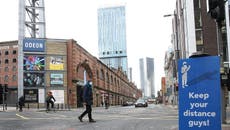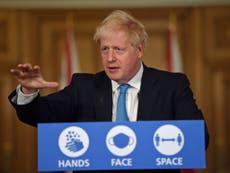Coronavirus: Quick-result tests deployed in trials in hotspot areas
New-style tests to be used in care homes, schools, universities and hospitals
Your support helps us to tell the story
From reproductive rights to climate change to Big Tech, The Independent is on the ground when the story is developing. Whether it's investigating the financials of Elon Musk's pro-Trump PAC or producing our latest documentary, 'The A Word', which shines a light on the American women fighting for reproductive rights, we know how important it is to parse out the facts from the messaging.
At such a critical moment in US history, we need reporters on the ground. Your donation allows us to keep sending journalists to speak to both sides of the story.
The Independent is trusted by Americans across the entire political spectrum. And unlike many other quality news outlets, we choose not to lock Americans out of our reporting and analysis with paywalls. We believe quality journalism should be available to everyone, paid for by those who can afford it.
Your support makes all the difference.Quick-result coronavirus tests are to be trialled in areas of northern England where cases are surging in a bid to speed up the process of isolating infected people, Downing Street has said.
And seven hospitals across England are to start regular testing of asymptomatic NHS staff with a recently developed saliva swab – known as a Lamp (loop-mediated isothermal amplification) test – in order to catch infections early.
Matt Hancock, the health secretary, said the tests showed “real promise” to provide “a path back to normal life”, while his predecessor, Jeremy Hunt, said their rollout was “potentially the most significant news on the fight against the virus for many, many weeks”.
Under a set of pilot schemes announced today, new-style lateral flow test kits will be sent to care homes, schools and universities in the northwest and northeast of England, as well as Yorkshire and the Humber, said Downing Street.
Priority will be given to areas in the tier 3 “very high” alert level, currently covering just Merseyside and Lancashire.
The swab tests deliver a result within an hour without the need to be sent to a lab, but during the pilot phase any positive test will then need to be confirmed by existing technology, said the prime minister’s official spokesperson.
Meanwhile, Lamp tests, which produce results within 60-90 minutes, will be made available immediately to staff in hospitals in Manchester, Basingstoke and Southampton.
Pilots will also begin shortly in Liverpool, Birmingham, Leeds and Newcastle.
Mr Johnson’s spokesperson said the purpose of the pilots was “to test the most effective way of using these new technologies”.
Mr Hancock later told the House of Commons: "We’re working hard to discover and evaluate new testing technologies that are simpler and faster and cheaper.
"Some of these tests can produce a result as quickly as in 15 minutes, and we will make them available to local directors of public health as part of our strategy for local action, starting with areas in a very high alert level.
"We're rolling them out across hospitals and across care homes to test patients and residents yet more regularly to keep people safe, and the schools and universities, so that we can keep education open safely through the winter.
"These tests have shown a real promise and we are buying them now and ramping up our ability to produce them at scale right here in the UK.
"We will stop at nothing to support this extraordinary scientific and logistical endeavour that can give us hope on the path back to normal life."
The PM’s spokesperson said that the government remained committed to delivering 500,000 conventional Covid tests a day by the end of this month, with more than 500 testing sites now operational and lab capacity “expanding rapidly”.
The spokesperson was asked whether Mr Johnson agreed with NHS Test and Trace chief Dido Harding that the programme was not a “silver bullet” solution to the pandemic.
He replied: “Testing is an important part of the government’s overall strategy, which also includes putting in place local restrictions to bring the virus under control, putting in place a protective ring around care homes and a very detailed campaign of public health advice for members of the public.”





Join our commenting forum
Join thought-provoking conversations, follow other Independent readers and see their replies
Comments